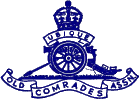 |
A Short History of the
|
prev index next |
|
Many people believe the 'great depression' was a phenomenon of the 1930's, but it really began in the 20's, the years 1928-35 being the worst. After World War I the New Zealand Government made heavy cuts in Defence expenditure; they suspended compulsory military training (but resumed it in 1921 on a modified scale), abolished TF camps, stopped sending Officer Cadets to Duntroon, and in 1922 reduced regular force strength. Soldiers with less than six months' service were suspended, but were later permitted to rejoin. By 1925 more funds became available and annual camps were resumed but the revival was brief. Further reductions in regular force establishments were ordered, and by 1929 the strength of the RNZA had dropped to 105 all ranks. Faced with the painful duty of putting the reductions ordered into effect, Officers Commanding RNZA Cadres had men dismissed on the slightest pretext, a typical example being Gunner B, later a member of our Association, who was caught bringing two small bottles of beer into camp. He was given the option of resigning or being sacked. In 1931 the Government imposed a 10% cut on regular force pay and allowances, followed by another in 1932. Further reductions in expenditure were made by 'converting' soldiers into civilians. For example a Staff Sergeant on £305 ($610) a year would be transferred to the Public Service section of the Defence Department where he was paid £180 ($360) for doing the same job. Instead of being permitted to retire at 55, the age then laid down in Regulations for the Military Forces of the Dominion of New Zealand 1927, on 31 March 1932 all ranks who had reached the age of 50 were compulsorily retired - except senior Officers. Those who were under 50 here retired as soon as they reached that age. Men who had subscribed to the Government Superannuation Fund received retiring allowances based on their reduced service; those who had not, received nothing. There was no redundancy pay, nor any attempt to rehabilitate them in any way, eg by finding them jobs in other departments. Jobs were extremely hard to find, especially for ex-soldiers, for it had become fashionable for a significant number of shallow-minded members of the public to denigrate the military forces, and everything for which they stood. New Zealand citizens, many of whom should have known better, referred to regular soldiers as 'unproductive units,' 'bludgers on the economy,' Gordon Coates' bastards,' etc, and demanded that money spent on defence be diverted to unemployment relief. Many employers in the private sector, pandering to the attitudes of their customers, refused members of their staffs who were Territorials leave to attend annual camp. Some threatened them with the sack if they did go. Now ex-members of the Armed Constabulary, Permanent Force and Police Force over the age of 65 who had not joined the Government Superannuation Fund or had retired before it was instituted - in most cases 'enjoyed' as their sole source of income the old age pension. In those days it was 17/6 ($1.75) a week, until in the unkindest cut of all the Government in 1932 reduced it too by 10%. The plight of these old servicemen was one of the chief reasons the New Zealand Permanent Force Old Comrades Association came into being. previous | index | next | History index | Home | ||